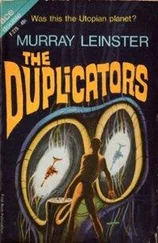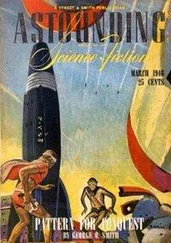“The fish have gone,” he said in a flat voice, “they’ve gone away. They didn’t scatter. We’d have seen it. Do you realize where they went?”
Terry nodded.
“Straight down. Do you want to hear an impossible explanation?”
I’ve thought of several,” said Davis.
Doug came and picked up the gun-cameras that Terry and Deirdre had used and went away with them.
“There’s a kind of sound,” said Terry, “that fish don’t like. They won’t go where it is. They try to get away from it.”
Deirdre said quietly, “I would too, if I were swimming.”
“Sound,” said Terry, “in water as in air, can be reflected and directed, just as light can be. A megaphone turns out one’s voice in a cone of noise, like a reflector on a light. It should be possible to project it. One can project a hollow cone of light. Why not a hollow cone of sound, in water?”
Davis said with an unconvincingly ironic and skeptical air, “Indeed, why not?”
“If such a thing were done,” said Terry, “then when the cone of sound was turned on, the fish inside it would be captured as if by a conical net. They couldn’t swim through the walls of sound. And then one can imagine the cone made smaller; the walls drawn closer together. The fish would be crowded together in what was increasingly like a vertical, conical net, but with walls of unbearable noise instead of cord. It would be as if the sea were electrified and the fish were shocked when they tried to pass a given spot.”
“Preposterous, of course,” said Davis. But his tone was not at all unbelieving.
“Then suppose something were sent up to the top of the cone, and it projected some kind of a cover of sound on the top of the cone and imprisoned the fish with a lid of sound they couldn’t endure. And then suppose that thing sank into the water again. The fish couldn’t swim through the walls of noise around them. They couldn’t swim through the lid of sound above them. They’d have to swim downward, just as if a hood were closing on them from above.”
“Very neat,” said Davis. “But of course you don’t believe anything of the sort.”
“I can’t imagine what would produce that sound in that way and send up a cork of sound to take the fish below. And I can’t imagine why it would be done. So I can’t say I believe it.”
Davis said slowly, “I think we begin to understand each other. We’ll stay as close to this place as we can until dawn, when we will find nothing to show that anything out of the ordinary happened here.”
“Still less,” said Terry, “to hint at its meaning. I’ve been doing sums in my head. That bright water was almost solid with fish. I’d say there was at least a pound of fish to every cubic foot of sea.”
“An underestimate,” said Davis judicially.
“When the bright patch was a thousand yards across—and it was even more—there’d have been four hundred tons of fish in the top three-foot layer.”
Davis seemed to start. But it was true. Terry added, “The water was clear. We could see that the packing went on down a long way. Say fifty yards at least.”
“Y-yes,” agreed Davis. “All of that.”
“So in the top fifty yards, at one time, there were at least twenty thousand tons of fish gathered together. Probably very much more. What La Rubia carried away couldn’t be noticed. All those thousands of tons of fish were pushed straight down. Tell me,” said Terry, “what would be the point in all those fish being dragged to the bottom? I can’t ask who or what did it, or even why. I’m asking, what results from it?”
Davis grunted.
“My mind stalls on who or what and why. And I’d rather not mention my guesses. I … No!” He moved abruptly away.
The Esperance remained under sail near the patch of sea that had glittered earlier and now looked exactly like any other square mile of ocean. The recorder verified the position by giving out, faintly, the same unpleasant humming noise, either louder or fainter. A soft warm wind blew across the waters. The land was somewhere below the horizon. The reel of recorder-tape ran out. It was notable that there were very few fish sounds to be heard, now. Very few. But the hum continued.
Toward morning it stopped abruptly. Then there was nothing out of the ordinary to be observed anywhere.
The sun rose in magnificent colorings. The sky was clear of clouds. Again the waves looked like living, leaping, joyous things. Gulls were squawking.
Doug came up from belowdecks. He carried some photographic prints in his hand. He’d developed and printed what the gun-cameras had photographed when the mysterious object, or beast, leaped clear of the sea. There were seven different pictures. Four showed flashbulb-lighted sections of empty ocean. One showed a column of sea water rising at fantastic height from the sea. Another one showed the edge of something at the very edge of the film.
The seventh picture Terry recognized. It was what he’d seen when the flash bulb of his gun-camera went off. The focus was not sharp. But it was neither a whale nor a blackfish—not even a small one—nor was it a shark. It was not a squid. It was not even a giant manta. The picture was a blurry representation of something unreal made for an unimaginable purpose, under abnormal conditions.
Deirdre looked at it over his shoulder. It could be a living creature. It could be… anything.
“You said you didn’t like mysteries,” commented Deirdre. “Are you sorry you came?”
The next morning the Esperance headed southeast over a sunlit sea. First, of course, the crew examined the sea’s surface for miles around. As expected, there was nothing remarkable to be observed. Davis did point out that there were no fish jumping, which was an indication that there were not as many fish as usual in this part of the ocean. But it was hard to be sure. There is no normal number of times when fish will be seen to jump. They usually jump to escape larger fish that want to eat them. The number is pure chance. But there seemed to be almost no jumps at all this morning.
It was not discussed at length, however. All the ship’s company was curiously reluctant to refer to the events of the previous night. In broad daylight, a detached review was simply impractical. With gulls squawking all about, with seas glinting in the sunshine, with decks to be washed and breakfast to be eaten, and commonplace, routine ship-keeping to be done, the adventure of the patch of shining sea seemd highly improbable. Terry felt that it couldn’t really have happened. To discuss it seriously would be like a daylight ghost tale. One was unable to believe it in daylight. It was better ignored.
Terry, though, did get out his tools to make a minor modification in the underwater microphone. It had been designed to be directional, so that the sound of surf or fish could be located by turning the mike, but he hadn’t been able to point it vertically downward, and last night that had been the key direction—right under the yacht’s keel. So now he improvised gimbals for the microphone, and a mounting for it similar to that of a compass, so it could tilt in any desired direction, as well as turn.
Which, of course, was a tacit admission that something peculiar had happened. Presently, Deirdre came and watched him.
“What’s that for?” she asked, when he fitted the gimbals in place.
He told her. She said hesitantly, “Yesterday, when I asked you not to try the paddle until we got to shallow water, you got angry and said you’d ask to be put ashore. We’re headed for Barca now. Someone there is building something for my father, the same thing I had asked you to build—a fish-driving instrument. If you still want to go, you can get a bus from there to Manila. But I hope you have changed your mind.”
Читать дальше










